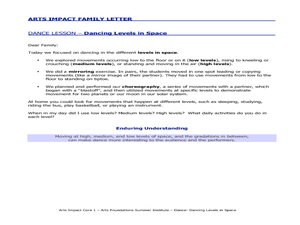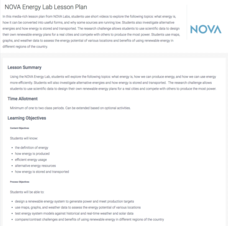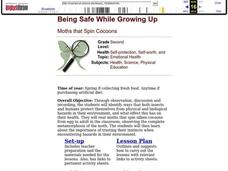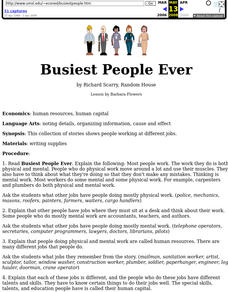Curated OER
Growing Up
Help little learners understand what happens during the human life cycle. Each slide defines and poses discussion questions regarding each phase of human life. Infancy, childhood, the teen years, adulthood, and old age are all covered....
Curated OER
Ages in Stages: An Exploration of the Life Cycle based on Erik Erikson's Eight Stages of Human Development
Examine Erikson's chart on the various stages one goes through growing up. Individually, they write a paper on whether or not they fit into those categories and how they are different today. In groups, for each stage they role play the...
Curated OER
Growing Up
This two-part resource helps little learners understand the life cycle. They view images that show how various creatures change from infancy to toddlerhood. Pupils use a circle to draw any life cycle they wish, showing it in four major...
Population Connection
Where Do We Grow from Here?
Did you know that the population is expected to grow to 11 billion by 2100? The resource serves final installment in a six-part series on the global population and its effects. Scholars interpret data from the United Nations about the...
Peace Corps
Introducing Culture
Growing up within a culture leaves a lot of ideas and values unspoken. Take a closer look at the cultures in which your learners live with a discussion activity that addresses cultural identity and traits of those living within the...
Children's Commissioner for Wales
Special Mission — Our Rights
Introduce young learners to the list of children's rights as defined by the UN Convention on the Rights of the Child (UNCRC) with a series of activities that get class members thinking about what they need to grow up safely and happily.
Consortium for Ocean Science Exploration and Engagement (COSEE)
Ocean Acidification: Whats and Hows
Open this activity by demonstrating the production of acidic carbon dioxide gas by activated yeast. Emerging ecologists then experiment with seashells to discover the effect of ocean acidification on shelled marine organisms. They...
National Wildlife Federation
Why All the Wiggling on the Way Up? CO2 in the Atmosphere
The climate change debate, in the political arena, is currently a hot topic! Learners explore carbon dioxide levels in our atmosphere and what this means for the future in the 11th installment of 12. Through an analysis of carbon dioxide...
Curated OER
Human Genes
In this science worksheet, students read 10 statements and 1 question about human genes. Students complete the statements and question by filling in the correct word from a list of 11 words.
Curated OER
Puberty Changes- Lesson 1
It may take a few clicks to find this lesson on the Alberta Health Services website, but it's well worth it. This is Lesson 1 in a series of six lessons. After setting up the ground rules, discuss puberty and the changes that affect your...
Curated OER
Understanding the Body: Day 2, Puberty
Everyone needs to know what to expect when going through puberty. Intended for a special education class, this well developed and developmentaly appropriate resource provides a full days instruction on teaching teens with special needs...
Curated OER
Dancing Levels in Space
Students practice mirroring human moves by performing a dance in class. In this physical education lesson, students utilize different spaces around them to perform a dance expressing their full motion. Students cooperate in pairs or...
Curated OER
Skeletal System (Continued)
Students examine human bones. For this skeletal system lesson, students review the functions and locations of bones in the human body. Students work in groups to complete an activity where they discover why bones are hollow and discuss...
Curated OER
Discrimination
Students investigate what discrimination is and study Article 2 from the Universal Declaration of Human Rights. They participate in a role play activity involving majority and minority groups for which a letter was sent home to parents....
Curated OER
Understanding the Body, Day 2: Puberty
What is puberty? Get your secondary special needs high schoolers on the right track with this develpmentally appropriate lesson. They define and describe the differences between men, women, boys, and girls, discuss major events that mark...
Curated OER
Understanding How Potatoes Grow
Second graders make a KWL chart and brainstorm what they need for the project of growing potatoes. They choose one potato and plant it in water or peat moss cups and choose a location in which meets the needs of the plants and make their...
Curated OER
The Climate Change Skeptic's Argument: Natural Solar Cycles or Human Activity?
Teachers explore patterns in sunspots and total solar irradiance to understand the counterpoint to the human effect of global warming. In this professional development tool, teachers work through a lesson on the sun's natural patterns to...
UAF Geophysical Institute
Carbon Footprint
Your young environmentalists can calculate their carbon footprint and discuss ways to reduce it with a worksheet about climate change. After reading a handout about what impact one's carbon footprint can have on the environment, kids...
PBS
NOVA Energy Lab Lesson Plan
Can our energy resources keep up with our ever-growing population? Science scholars learn the basics of energy and Earth's energy resources during an electrifying lesson. The resource combines video clips and an engineering design...
Curated OER
A Little More Advanced Biotechnology Tools: Better Plasmids
A nice set of information that will help your students understand the process of using recombinant plasmids. DNA hybridization and blotting mechanisms help illustrate expressed genes and the concepts behind the Human Genome Library....
Curated OER
Being Safe While Growing Up
Second graders identify ways that both insects and humans protect themselves from physical and biological hazards in their environment. They rear moths from egg to adult and consider the importance of trusting their own instincts.
Curated OER
The Human Impact on the Environment
Despite the typos and formatting issues, the Word document found here has some great potential. There are two questions that ask learners to put several events in a logical order; these could easily be made into a card sort activity....
University of Colorado
Patterns and Fingerprints
Human fingerprint patterns are the result of layers of skin growing at different paces, thus causing the layers to pull on each other forming ridges. Here, groups of learners see how patterns and fingerprints assist scientists in a...
Curated OER
Busiest People Ever
Students write a paragraph about what they want to do when they grow up. They include the special skills and education (human capital) they must have to do the job they've chosen.

























